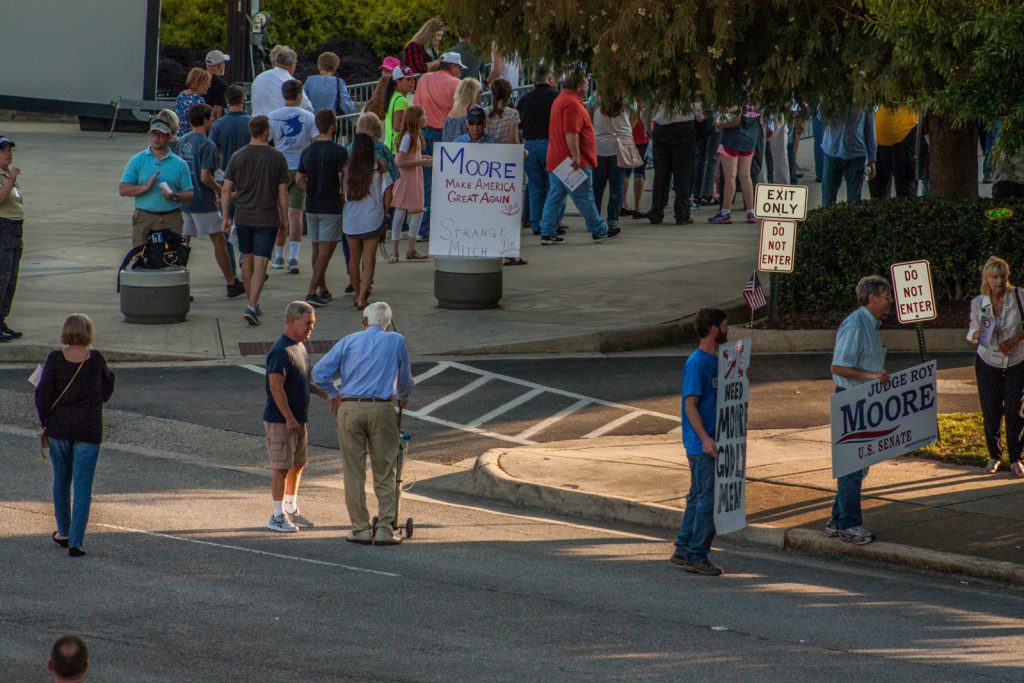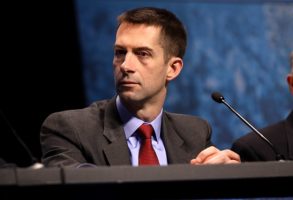
Published December 10, 2017
There are times in life when the institutional ground underneath you begins to crumble — and with it, longstanding attachments. Such is the case for me when it comes to the Republican Party and evangelicalism.
I’ve been a part of both for my entire adult life. These days, though, in many important ways they are having harmful effects on our society.
The latest example is in Alabama, where Roy Moore, the Republican Senate candidate, stands accused of varying degrees of sexual misconduct by nine women, including one who was 14 years old at the time. Mr. Moore leads in most polls, and solidly among most evangelicals, heading into Tuesday’s election.
A bit of personal history may be in order here. As a young man I embraced conservatism as a political philosophy and the Republican Party as its political home. The first vote I cast was in 1980 for Ronald Reagan. I had spirited debates with classmates at the University of Washington in Seattle, which was hardly a hotbed of conservatism. They couldn’t begin to understand what I was doing. Yet I was proud to make the case for Reagan and consider myself fortunate to have worked in his administration in its second term.
At roughly the same time, I was in the midst of a pilgrimage of faith that started as vague deism but eventually led me to evangelicalism. Both the Republican Party, which was created to end slavery and preserve the Union, and evangelicalism, a transdenominational effort to faithfully represent Christ in word and deed, shaped my life and outlook, helping me to interpret the world.
Politics and faith are hardly synonymous. They occupy different realms, and my faith has a far more important and cherished place in my life than politics. Yet both are significant to me, and the two spheres are not entirely distinct.
Some of the most impressive moral movements in American politics — the efforts to abolish slavery and to end segregation and the struggle to protect unborn life — have been informed by Christianity. Two of the monumental figures in the latter half of the 20th century, Reagan and Pope John Paul II, together helped to bring down one of the most malevolent political movements in history: Soviet-led Communism.
More recently, the global AIDS and malaria initiative is one of President George W. Bush’s greatest legacies; more than 13 million people are on lifesaving antiretroviral treatment as a consequence. This, too, was a policy that came about in response to human sympathies that were shaped in large part by the faith of Mr. Bush and some of his key advisers.
I don’t mean to imply that politics and religion are a perfect fit. Often they’re not, and over the years Christians, myself included, have not gotten the balance right. But overall I felt that the Republican Party and the evangelical movement were imperfect forces for good, and I spent a large part of my life defending them.
Yet the support being given by many Republicans and white evangelicals to President Trump and now to Mr. Moore have caused me to rethink my identification with both groups. Not because my attachment to conservatism and Christianity has weakened, but rather the opposite. I consider Mr. Trump’s Republican Party to be a threat to conservatism, and I have concluded that the term evangelical — despite its rich history of proclaiming the “good news” of Christ to a broken world — has been so distorted that it is now undermining the Christian witness.
Just the other day I received a note from a friend of mine, a pastor, who told me he no longer uses the label “evangelical” to describe himself, even though he meets every element of its historical definition, “because the term is now so stained as to ruin my ability to be what evangelicalism was supposed to be.”
Another pastor who is a lifelong friend told me, “Evangelical is no longer a word we can use.” The reason, he explained, is that it’s become not a religious identification so much as a political one. A third person, who heads a Christian organization, told me the term evangelical “is now a tribal rather than a creedal description.” In October, the Princeton Evangelical Fellowship, a campus ministry for more than 80 years, changed its name to the Princeton Christian Fellowship. “We’re interested in being people who are defined by our faith and by our faith commitments and not by any sort of political agenda,” according to Bill Boyce, who has led the campus group for decades.
There are of course a great many honorable individuals in the Republican Party and the evangelical movement. Those who hold different views than I do lead exemplary lives. Yet I cannot help believing that the events of the past few years — and the past few weeks — have shown us that the Republican Party and the evangelical movement (or large parts of them, at least), have become what I once would have thought of as liberal caricatures.
Assume you were a person of the left and an atheist, and you decided to create a couple of people in a laboratory to discredit the Republican Party and white evangelical Christianity. You could hardly choose two more perfect men than Donald Trump and Roy Moore.
Both have been credibly accused of being sexual predators, sometimes admitting to bizarre behavior in their own words. Both have spun wild conspiracy theories, including the lie that Barack Obama was not born in America. Both have slandered the United States and lavished praise on Vladimir Putin, with Mr. Moore declaring that America today could be considered “the focus of evil in the modern world” and stating, in response to Mr. Putin’s anti-gay measures in Russia: “Well, maybe Putin is right. Maybe he’s more akin to me than I know.” Both have been involved with shady business dealings. Both have intentionally divided America along racial and religious lines. Both relish appealing to people’s worst instincts. Both create bitterness and acrimony in a nation desperately in need of grace and a healing touch.
I hoped the Trump era would be seen as an aberration and made less ugly by those who might have influence over the president. That hasn’t happened. Rather than Republicans and people of faith checking his most unappealing sides, the president is dragging down virtually everyone within his orbit.
In the latest example of this, a rising number of Republicans are attempting to delegitimize the special counsel’s investigation into whether there were links between Mr. Trump’s presidential campaign and Mr. Putin’s Russia because they quake at what he may find. Prominent evangelical leaders, rather than challenging the president to become a man of integrity, have become courtiers. What’s happening with Mr. Moore in Alabama — with the president, the Republican National Committee, the state party and many white evangelicals rallying around him — is a bridge too far for many of us. Where exactly is the bottom? And at what point do you pull back from associating yourself with a political party and a religious term you once took pride in but that are now doing harm to the things you treasure?
Institutional renewal and regeneration are possible, and I’m going to continue to push for them. But for now a solid majority of Republicans and self-described evangelicals are firmly aboard the Trump train, which is doing its utmost to give a seat of privilege to Mr. Moore. So for those of us who still think of ourselves as conservative and Christian, it’s enough already.
Peter Wehner, a senior fellow at the Ethics and Public Policy Center, served in the last three Republican administrations and is a New York Times contributing opinion







